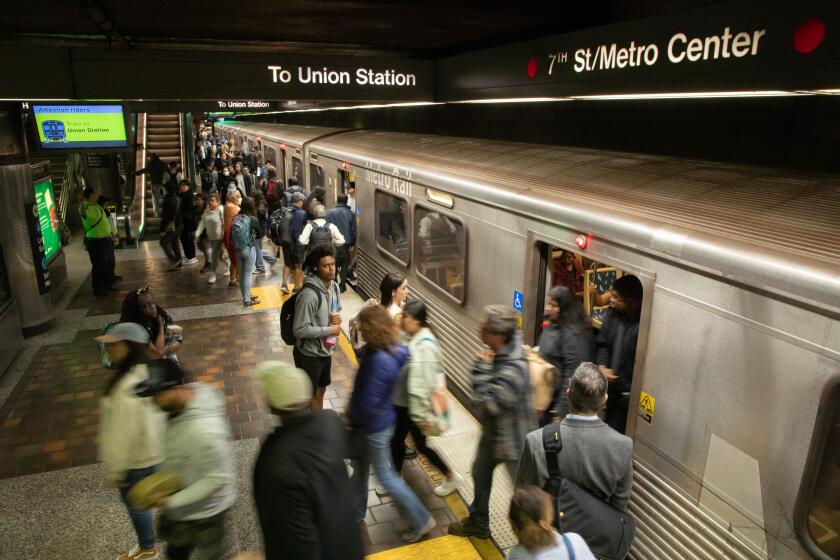Woman alleges hate crime, negligence in May attack on Metro, according to lawsuit

A 53-year-old Asian woman who was attacked on Metro’s A Line in Long Beach this May — an incident that sparked further concern about safety on the public transportation system — is suing Metro, claiming the attack was a hate crime and that train employees failed to help her.
The woman alleges that Metro and its employees were negligent in the attack, forcing her to “fend for herself” while she was punched repeatedly by another passenger, according to a lawsuit filed this month in Los Angeles County Superior Court. The woman, who requested her name not be published out of fear, said she was the victim of a hate crime because the attacker shouted about her Asian ethnicity before assaulting her.
The attack was “foreseeable and preventable,” the woman’s attorney, Steven Haney, wrote in the complaint.
“Metro failed in its legal duty to protect the public and passengers ... from harassment, attacks, and racial hate crimes on public transportation, even when it knows that harassment, attacks, and racial hate crimes are a problem on its trains,” the complaint said.
Attorneys for Metro have not yet responded to the suit. A spokesperson for the agency did not respond to a request for comment.
Los Angeles County Supervisor Janice Hahn has called for a review of the response to a recent attack of a woman on a Blue Line train, where witnesses said it took too long for police and Metro officials to help.
The Long Beach Police Department, which is investigating the incident, said they have no updates in the case as of this week. No arrests have been made.
The agency also mentioned that “at this time, we have no information to indicate this was a hate or bias motivated incident,” according to a statement released this week. While the lawsuit includes quotes of insults, the victim was unable to recall specific phrases her attackers used during an initial interview with officers after the incident, according to body-worn camera footage shared with The Times. However, the woman was adamant in the interview that the attack was racially motivated.
Long Beach Police also said that detectives have “attempted to interview the victim,” but the woman has not participated, the statement said. Haney pointed out that his client was interviewed “extensively” the day of the incident — as recorded in the body camera footage — and said he recommends against a second interview once a lawsuit has been filed.
LBPD’s statement said detectives have reviewed available surveillance footage, but did not share it with The Times or provide details.
According to the complaint, the woman boarded a northbound A Line train in Long Beach May 17 with her male friend, both of them taking a seat. Soon after two younger women boarded the train, choosing to stand.
The woman said she warned her male friend to not reach out to the younger women, even if they appeared to be off balance, worried it could be misinterpreted, the lawsuit said.
According to the lawsuit, that’s when another man started yelling “racist slurs and sexist insults” at the woman, calling her an “Asian b—,” telling her she shouldn’t tell a man what to do.
The woman and her friend tried to move away from the man yelling, but then the younger women joined in, also calling her “Asian b—”, while the one “lunged at [the woman] and repeatedly punched [her] in the face.”
The trend has prompted relief but also concern that some Asian Americans are not reporting attacks against them as attention on the topic fades.
The woman said the attack left her bruised and battered; the police report said she had a “visible contusion” on her forehead.
The lawsuit claimed the train’s conductor was not far during the incident, “with the ongoing attack in his plain view,” but instead of responding, the employee “allowed it to continue.” The conductor was not named in the lawsuit.
A bystander on the train tried to call 911 and contacted the conductor, but the conductor “refused to stop the train or aid” the woman, the lawsuit said. They “repeatedly pressed the emergency stop button” but the conductor did not make an emergency stop.
The Metro employee failed “to follow the protocol for emergency train stops, failing to take appropriate actions to ensure the safety of passengers, failing to intervene on [the woman’s] behalf when particular passengers committed crimes,” the lawsuit said. The conductor also did not alert police of the situation, so no officers were waiting for the victim once the train did stop.
The woman claims she not only suffered physical injuries, but also “severe psychological and emotional distress,” and now lives in “fear of riding the Metro and of getting attacked again due to her race,” the complaint said.
More to Read
Sign up for Essential California
The most important California stories and recommendations in your inbox every morning.
You may occasionally receive promotional content from the Los Angeles Times.












